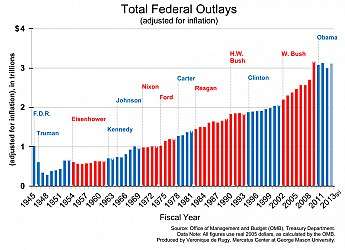Carter vs. Reagan on Spending, Take 2 featuring Ramesh Ponnuru
Earlier today, I posted an article titled "Rand Paul Is Right: Carter was thriftier than Reagan." I updated the argument with a correction at noon ET. The article discusses the Kentucky senator's characterization in the larger context of GOP and national politics, but here's the nub of the argument:
Paul is correct to say that Reagan was worse than Carter when it came to spending. As [Veronique] de Rugy does the math, Carter increased real spending 17 percent over the last budget of his predecessor, Gerald Ford. Over two terms, Reagan increased spending by 22 percent over Carter's final budget. On an annualized basis, then, Carter grew spending by 4.25 precent a year, while Reagan grew it by 2.75 percent. However, when expressed as a percentage of GDP, spending under Carter averaged 20.6 percent per year while Reagan averaged 21.6 percent. Spending typically really gears up in a second-term president's final years, so it's plausible to theorize that had Carter managed to stick around for eight years, he might have equaled or surpassed what the real-world Reagan managed. Note: The paragraph above has been edited to better reflect annual spending patterns.
When it comes to debt, there's no question that Reagan was worse. Over an eight-year reign, he tallied up $1.4 trillion in deficits, or an average of $177 billion per year. Carter—a famously cheapskate Southern Baptist—racked up just $253 billion over four years, for an average deficit of $63 billon per year. Tax revenue went up sharply under Reagan, for sure, but like a Hollywood big shot, he still managed to spend ever larger amounts, resulting in an average annual deficit of 4.1 percent of GDP. The Peanut Farmer From Plains? A relatively tiny 2.3 percent of GDP. (All this data if from the Congressional Budget Office.)

Over at National Review's The Corner, Ramesh Ponnuru read the story before my correction and writes:
I think Gillespie makes some good points along the way. But I don't think his central fact is a fact. Gillespie writes: "Paul is also correct to say that Reagan was worse than Carter when it came to spending. . . . Carter increased real spending 17 percent over the last budget of his predecessor, Gerald Ford. Over two terms, Reagan increased spending by 22 percent over Carter's final budget."
But that means that on average, spending increased 4 percent per year under Carter and 2.5 percent per year under Reagan. That's a pretty sizable difference: If Carter had merely kept spending at the same rate in a second term, his total would have been 37 percent. Reagan looks worse only if you hold getting re-elected against him.
Update: Gillespie has edited the post. His new numbers are slightly off. (He's getting the annualized rates of increase by dividing the total increase by the number of years, which ignores compounding; you have to take roots.) But he concedes that on an annual basis, Carter increased spending faster than Reagan. Gillespie does not, however, agree with me that this fact is fatal to the Gillespie/Paul claim that Carter was the thriftier of the two.
I only now read Ponnuru's comments and do indeed stand by my claim that Carter was thriftier than Reagan. Thrift is not simply a question of how much you spend. It also has to do with balancing income and outlays. On this score, there's simply no way to pretend that Reagan acted responsibly. Tax revenue increased dramatically under Reagan and yet he still managed to massively increase the national debt. You don't do that by being thrifty.
Focusing just on spending, Carter comes out a clear winner if the metric is spending as a percentage of GDP. And as the chart above underscores, Reagan spent more each year than Carter did. While constantly increasing spending year over year has come to be expected, there's no iron law dictating that it happen. Just look at spending under Eisenhower, Nixon, and H.W. Bush for cases where presidents maintained essentially flat outlays. Clinton kept a tight leash on spending in the first four years of his presidency.
The annual rate of increase is an important factor to consider when evaluating spending patterns but it's simply one among many relevant metrics. On most of these, Carter does just swell. More important, there is nothing in Reagan's record to suggest he tamed Leviathan while in office. Somehow I doubt that most folks at National Review would say Obama is a cheapskate because annual increases in spending have been low on his watch.
Related: At Bloomberg View, Ponnuru says that while Rand Paul has no shot at the Republican presidential nod, "he has a better shot than any of the other candidates for getting picked for the No. 2 slot."


Show Comments (82)